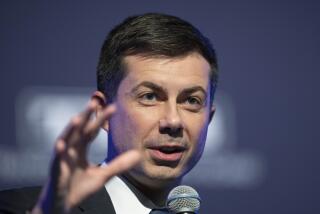Mineta’s Roots Help Him Manage Crisis
- Share via
WASHINGTON — Until 8:46 a.m. on Sept. 11, the biggest problem on Transportation Secretary Norman Y. Mineta’s agenda was airport delays.
But minutes after a hijacked airliner smashed through the first of two towers in the World Trade Center, Mineta hurriedly excused himself from breakfast with a visiting Belgian dignitary and rushed from his suite overlooking the Potomac River to a secure operations center in the White House complex.
The nonstop days and sleepless nights that followed were times of unmatched intensity in the life of the 69-year-old former Democratic congressman from San Jose.
He approved the first shutdown of U.S. airspace in history as incredible scenes of devastation played out on television and telephone lines from the field lit up in confirmation. Then, just as the airports reopened, he had to help broker a deal to bail out the stricken airlines. Now, Mineta is carrying out an emergency review of airport and airliner security, which will lead to major changes for travelers.
“There is no doubt that this whole transportation system is going to be really different than what we knew,” Mineta said in an interview. “It’s changing right now.”
When Mineta was appointed transportation secretary, many in Washington saw his chief value to President Bush’s Cabinet as providing diversity--political and ethnic. His status as the only Democrat in the Cabinet was much mentioned. His standing as a prominent Japanese American also drew attention. But only industry insiders noted his aviation expertise during his many years on the House Transportation Committee.
Now, Mineta has taken a major role in the administration’s crisis response to terrorism.
His presence at a time of increased hostility toward Arab Americans has touched the conscience of the Bush White House. As a boy of 10 after Pearl Harbor, Mineta was interned along with his family in camps for Japanese Americans who were suddenly considered suspect. Last week, a Michigan congressman asked Bush to address the fears of Arab Americans and Muslims over reprisals.
According to Mineta, the president responded: “You are absolutely right. We can’t have another situation like the one Norm Mineta was in during World War II.”
Bush has taken pains to distinguish ordinary Muslims and Arab Americans from the attackers and to portray Islam as a religion of peace and justice. Mineta says he feels a kinship of experience with Arab Americans and wants to do something in coming days to reach out.
During the 1991 Persian Gulf War, when Mineta was a senior Democratic member of Congress, an Arab American doctor from Michigan called him to complain that he had been grilled by the FBI as part of a plan to randomly question people of Middle Eastern descent. Mineta responded by setting up a meeting with the FBI director. It was explained to him that Arab Americans were being visited in part “for their own protection.”
“I said, ‘Hold it, what do you mean?’ ” Mineta recalled. “As a 10 1/2-year-old kid, I got placed in a camp because people couldn’t make the distinction between the Japanese who were attacking and those of us who were living in California, Washington and Oregon, and who by an accident of birth were of Japanese ancestry.
“They told us then this was done for our protection,” he added. “But if we were in there for our own protection, then why were the machine guns pointed in?”
After hearing Mineta’s story, the FBI director thought it over and called off visits by agents to Arab Americans.
It is too early to tell how Mineta and the agencies he oversees will be judged when the nation conducts a full review of what happened Sept. 11. The early assessment within the Transportation Department and the Federal Aviation Administration is that air traffic controllers performed well, safely bringing down more than 4,000 planes within three or four hours in a chaotic atmosphere aggravated by constant bomb threats and false hijacking reports. Airport security--a problem for the last 30 years--is getting unprecedented attention in Congress, but direct criticism of Mineta has been muted.
More to Read
Get the L.A. Times Politics newsletter
Deeply reported insights into legislation, politics and policy from Sacramento, Washington and beyond. In your inbox three times per week.
You may occasionally receive promotional content from the Los Angeles Times.










